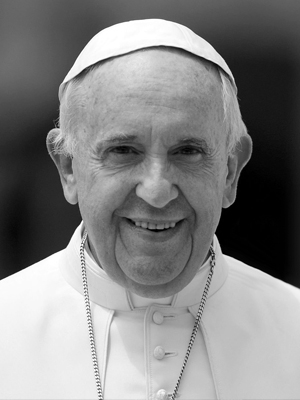         |
||||||||
   |
||||||||
 (Photo: Giulio ORIGLIA Getty Images) |
DIALECTIC
MEDAL LAUREATE—2O23 CITATION:
Vatican Undersecretary for Culture and Education, Fr. Antonio Spadaro, has known Francis for many years, and says, in a word, “The Pope is volcanic; he likes to enter into dialogue, to open doors and windows, do an abrupt turn, but above all enter into a dialectic... He doesn’t engage in dialogue without referring to some sort of concrete experience... His type of reasoning isn’t based on abstract concepts, but is a reflection and an exchange about real life.” (My Door Is Always Open, p. 2) In one of these dialogues, the Pope explained to Fr. Spadaro: “Opposition opens up a path, a road to travel down... Speaking more generally, I must say that I love oppositions... Oppositions help. Human life is structured in oppositional form.” (Open to God: Open to the World, p. 60) DIRECTOR'S STATEMENT: "Francis
is known for seeking out opposition, difference, polarity, tension,”
says Institute Director, Justin Burke, “not in order to eradicate
or cancel them out, but, in true dialectical fashion, to maintain
and preserve them on what he describes as ‘a higher plane’.” STATEMENT
FROM PROF. MASSIMO BORGHESI: "Jorge Mario Bergoglio's dialectical thought essentially depends upon his youthful reading of Gaston Fessard, the Jesuit who had listened to Alexandre Kojève's lectures on Hegel in Paris, and on his doctoral work on Romano Guardini's polar anthropology. These are authors who come from the great protagonist of the Tübingen School, Adam Möhler, the author for whom Catholicism appeared as a coincidence of opposites. From here comes a dialectical conception of the world that [...] is an antinomian, polar thought, in which the synthesis appears precarious, continually evolving, never resolved. This idea is at the center of Pope Francis' anthropological, social, political and ecclesiological thought." The Dialectic Medal was established in 2020 to recognize and foster dialectical thinking in diverse fields of theory and practice worldwide. Its inaugural recipient was the German philosopher, Jürgen Habermas. The 2023 award was announced on 17 Dec., Pope Francis’s 87th birthday, and presented by the Institute's Director during a Papal audience at the Vatican in Feb. 2024. |
|||||||
|
DIALECTIC
MEDAL LECTURE: |
||||||||
  |
|
 |
||||||
|
© 2O2O–4 INSTITUTE FOR ADVANCED DIALECTICAL RESEARCH
|
||||||||



